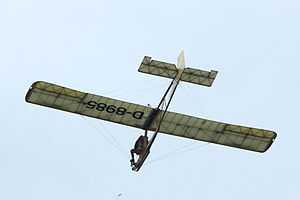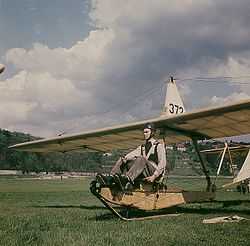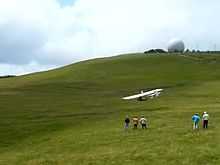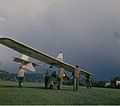DFS SG 38 Schulgleiter
| SG 38 Schulgleiter | |
|---|---|
 | |
| SG.38 reproduction | |
| Role | Glider |
| National origin | Germany |
| Designer | Schneider, Rehberg and Hofmann |
| First flight | 1938 |
| Introduction | 1938 |
| Status | No longer in production |
| Number built | about 10,000 |
| Developed from | Stamer Lippisch Zögling |
The SG 38 Schulgleiter or Schneider DFS 108-14 SG-38 Schulgleiter (English: School glider) is a German high-wing, cable-braced, single-seat primary glider that was designed by Schneider, Rehberg and Hofmann at Edmund Schneider's factory at Grunau in 1938, hence the designation.[1][2]
Design and development
The SG 38 was designed to be a training glider for basic flight training by the Nationalsozialistisches Fliegerkorps (NSFK). The usual launch method was by bungee cord from a sloped hill. Because training was conducted solely by solo flight the aircraft had to be very easy to fly and also easy to repair.[1]
The high-wing design uses a kingpost and cable bracing. The primary structure of the glider is of wood, with the wings, tail surfaces and inverted "V" kingpost all finished in doped aircraft fabric covering. The pilot sits on a simple seat in the open air, without a windshield.
The basic configuration was similar to earlier gliders such as the Stamer Lippisch Zögling and the Grunau IX, but the SG 38 was an entirely new design. Improvements included enlarged tail surfaces for better stability, a separate skid mounted on shock-absorbing springs, and an updated seat for the pilot.[3]
Operational history

The SG-38 played a critical role in pilot training for the Luftwaffe in the Second World War, as a simple, but robust, trainer for the rapid increase in the number of pilots needed by Germany. It was commonly flown by bungee launch on the slopes of the Wasserkuppe.[2]
From 1949 to 1951 Spain's AISA produced 50 licence-built aircraft.[4]
In the UK, Elliotts of Newbury (EON) built the SG.38, their version first flown in 1948 and used by the RAF as the Eton TX.1.
Aircraft on display
- Deutsches Museum, Munich, Germany[1]
- Musée de l'Air et de l'Espace, Paris – Le Bourget Airport, France[5]
- National Museum of the United States Air Force, Dayton, Ohio, USA[2]
- Museo del Aire, Madrid, Spain[4]
Specifications (SG 38)

General characteristics
- Crew: One
- Length: 6.28 m (20 ft 7 in)
- Wingspan: 10.41 m (34 ft 2 in)
- Height: 2.43 m (8 ft 0 in)
- Wing area: 16 m2 (170 sq ft)
- Aspect ratio: 6.76
- Empty weight: 100 kg (220 lb)
- Gross weight: 210 kg (463 lb)
Performance
- Maximum speed: 115 km/h (71 mph; 62 kn)
- Never exceed speed: 115 km/h (71 mph; 62 kn)
- Maximum glide ratio: 10:1 at 52 km/h
- Wing loading: 13.75 kg/m2 (2.82 lb/sq ft)
See also
- Related development
- Aircraft of comparable role, configuration and era
- Related lists
Images
-

SG-38 bungee launch
-

SG-38 landing
-

SG-38 being carried to the launch point
-

SG-38 in the Deutsches Museum Munich, Germany
References
- ↑ 1.0 1.1 1.2 Deutsches Museum (n.d.). "Basic Training Glider SG 38, 1938". Retrieved 14 May 2011.
- ↑ 2.0 2.1 2.2 National Museum of the United States Air Force (n.d.). "Schneider Schulgleiter SG 38". Retrieved 19 August 2011.
- ↑ Sailplanes 1920-1945, Martin Simons, EQIP, 2001
- ↑ 4.0 4.1 Museo del Aire (n.d.). "Fotografía del Aisa Schneider Shulgleiter". Retrieved 25 March 2013.
- ↑ "List'In MAE" (in French). 2011. Retrieved 23 May 2011.
External links
| Wikimedia Commons has media related to SG 38. |
| ||||||
| ||||||||||||||||||||||